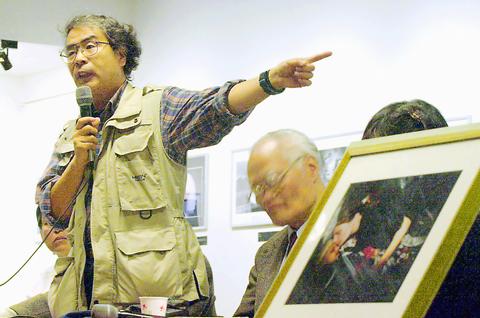Activists took their anti-nuclear message to the art gallery yesterday, saying that an exhibition of photographs of the aftermath of the 1986 Chernobyl nuclear disaster could help make people rethink issues pertaining to the Fourth Nuclear Power Plant (
More than 40 works by the Japanese photographer Hirokawa Ryuichi (

PHOTO: CHIANG YING-YING, TAIPEI TIMES
Hirokawa, a recipient of several prizes, including one from the International Organization of Journalists, visited Ukraine more than 40 times after the Chernobyl accident to photograph abandoned villages and survivors suffering from the effects of radioactive fallout.
The exhibition of photographs called Mourning Nature -- the Truth of Chernobyl (
Hirokawa decided to have an exhibition in Taiwan last October when he learned that Taiwan was going to halt the construction of the controversial plant.
The exhibition, organized by the Taiwan Environmental Protection Union, is a warm-up for the "224 Anti-nuclear Demonstration" (二二四反核大遊行) to be held on Saturday in Taipei. It is expected to attract thousands of demonstrators.
Among Hirokawa's works being exhibited in Taipei, a photo showing a heartbroken young mother kissing her dead child lying in a coffin was used by Premier Chang Chun-hsiung (張俊雄) at a press conference last October, when he announced the decision to scrap the plant.
"It's a taboo for people there to take photos of dead children. The mother, however, asked me to take a picture as a way of reminding people elsewhere of the horrible outcome of nuclear accidents," Hirokawa said at a press conference in Taipei yesterday.
For the past 15 years Hirokawa has been recording the aftermath of the Chernobyl accident. During this period he has lost several close friends, who had helped him when his was working in the Ukraine.
"Some of my friends there died. Even as the outside world was gradually forgetting the tragedy, people in the Ukraine who were contaminated by radioactive fallout from Chernobyl, were dying," Hirokawa said.
Seventeen paintings by Chernobyl victims are also on display at the exhibition, including a self-portrait of a teenage girl with an ugly scar on her neck left by thyroid gland operation.
Hirokawa said that radiation from Chernobyl had seriously polluted at least 10,000km2, about one-third of the area of Taiwan, forcing people to move out of their polluted homes. It has been estimated that a total of 160,000km2 was polluted by radioactive fallout in the aftermath of the accident.
Kao Cheng-yan (高成炎), one of main organizers of the demonstration to be held on Saturday, said that Hirokawa's works had been used by anti-nuclear activists in previous demonstrations to remind people of the horrors of nuclear accidents.
Su Tzen-ping (
Hirokawa will visit Kungliao township, Taipei County, where the partially constructed nuclear plant is located, to record the coastal scene in nearby Yenliao (鹽寮). Taiwanese marine scientists have warned that the coastal environment has been gradually damaged by the construction of the plant.

FREEDOM OF NAVIGATION: The UK would continue to reinforce ties with Taiwan ‘in a wide range of areas’ as a part of a ‘strong unofficial relationship,’ a paper said The UK plans to conduct more freedom of navigation operations in the Taiwan Strait and the South China Sea, British Secretary of State for Foreign, Commonwealth and Development Affairs David Lammy told the British House of Commons on Tuesday. British Member of Parliament Desmond Swayne said that the Royal Navy’s HMS Spey had passed through the Taiwan Strait “in pursuit of vital international freedom of navigation in the South China Sea.” Swayne asked Lammy whether he agreed that it was “proper and lawful” to do so, and if the UK would continue to carry out similar operations. Lammy replied “yes” to both questions. The

‘OF COURSE A COUNTRY’: The president outlined that Taiwan has all the necessary features of a nation, including citizens, land, government and sovereignty President William Lai (賴清德) discussed the meaning of “nation” during a speech in New Taipei City last night, emphasizing that Taiwan is a country as he condemned China’s misinterpretation of UN Resolution 2758. The speech was the first in a series of 10 that Lai is scheduled to give across Taiwan. It is the responsibility of Taiwanese citizens to stand united to defend their national sovereignty, democracy, liberty, way of life and the future of the next generation, Lai said. This is the most important legacy the people of this era could pass on to future generations, he said. Lai went on to discuss

MISSION: The Indo-Pacific region is ‘the priority theater,’ where the task of deterrence extends across the entire region, including Taiwan, the US Pacific Fleet commander said The US Navy’s “mission of deterrence” in the Indo-Pacific theater applies to Taiwan, Pacific Fleet Commander Admiral Stephen Koehler told the South China Sea Conference on Tuesday. The conference, organized by the Center for Strategic and International Studies (CSIS), is an international platform for senior officials and experts from countries with security interests in the region. “The Pacific Fleet’s mission is to deter aggression across the Western Pacific, together with our allies and partners, and to prevail in combat if necessary, Koehler said in the event’s keynote speech. “That mission of deterrence applies regionwide — including the South China Sea and Taiwan,” he

UNPRECEDENTED: In addition to the approved recall motions, cases such as Ma Wen-chun’s in Nantou are still under review, while others lack enough signatures The Central Election Commission (CEC) announced yesterday that a recall vote would take place on July 26, after it approved the first batch of recall motions targeting 24 Chinese Nationalist Party (KMT) lawmakers and Hsinchu Mayor Ann Kao (高虹安). Taiwan is in the midst of an unprecedented wave of mass recall campaigns, following a civil society push that echoed a call made by Democratic Progressive Party (DPP) caucus whip Ker Chien-ming (柯建銘) in January to initiate signature drives aimed at unseating KMT legislators. Under the Civil Servants Election and Recall Act (公職人員選舉罷免法), Taiwanese can initiate a recall of district-elected lawmakers by collecting